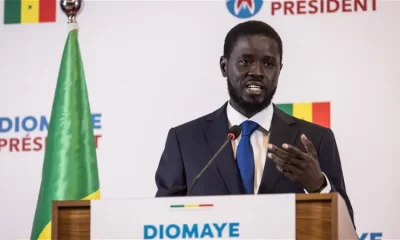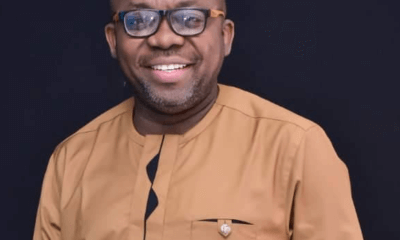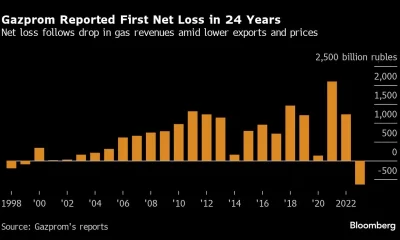Global Issues
Unraveling Geopolitical Truth: Inexplicable Cancellation of ‘The Convention 2024’ -By Kester Kenn Klomegah
Contrary to profound expectations, public reactions that emerged were a bit mixed. The Diaspora Affairs Directorate at the Office of the President explained why the programme was cancelled. According to Dr Nadia Adongo Fynn, Deputy Director of the Diaspora Affairs Directorate, the decision to withdraw the permission granted for hosting the event was necessitated by an “unforeseen” state event scheduled to take place at the same venue. The Jubilee House Communication Secretariat also issued an official letter that circulated among media houses.

Understandably, it was described as a precarious beginning of 2024 at the widely-known historic Ghana’s Independence Square, where the latest political gathering was scheduled early January under the title: “The Convention – Igniting The Voices Of Africa” as a platform to emphasize effective leadership and the involvement of youth contributing to Africa’s development. The Convention was sponsored by the New Africa Foundation.
The return was planned strategically to mark an impactful political convention at that popular historical venue of the struggle against colonialism, a revolutionary square where the “Big Six” including Osagyefo Dr. Kwame Nkrumah and Dr. J. B. Danquah, the founding fathers of present-day Ghana, held their joint UGCC political conventions. It was also the place what became known as the “Christianborg Cross-Roads shooting” occurred in February 1948.
Perhaps, the pan-Africanists may have missed the most pervasive myth over growing neocolonialism and the desire by the Africa’s youth towards better economic engagement. Of course, Africa consists of 54 independent countries, each with its own political approach, economic dimensions and socio-cultural uptakes. A glimpse at the trends in the continent shows only a few have realization to change the political status quo, and to join the multi-polarity and the desire in building of a community with a shared future for mankind.
Given the series of major issues and challenges facing the world today, China calls for an equal and orderly multipolar world and a universally beneficial and inclusive economic globalization. An equal and orderly multipolar world is one in which all countries, regardless of size, are treated as equals, hegemonism and power politics are rejected, democracy is truly promoted in international relations, and true multilateralism must be practised.
According to reports monitored from Business & Financial Times (B&FT), Julius Makema, Dr. Afrikana Chihombori-Quao from Zimbabwe, Nigeria’s presidential candidate Peter Obi and, Professor PLO Lumumba from Kenya to speak at The Convention 2024. This event was designed to encompass different facets of African excellence, including thought leaders and artists, all before an eclectic audience, coinciding with Ghana’s Constitution Day at the Kwame Nkrumah Independence Square.
The main objectives were as follows: (i) Unifying African Voices: Bring together diverse voices from across the continent to collectively address the challenges posed by external political influences on Africa’s self-governance.
(ii) Fostering Dialogue: Facilitate open and constructive dialogue among thought leaders, policymakers, and visionaries, providing a platform for the exchange of ideas on shaping Africa’s political landscape.
(iii) Empowering African Leadership: Empower individuals with a shared vision for Africa’s progress, providing a stage for consolidating the path for true and new African leadership. Decisive Leadership, Principled Voices, and Youthful energies that light a vision which is aligned with the commitments of the New Africa Foundation for Transformative Leadership.
The main message and expected impact were clearly made public. There was absolutely no hidden agenda. (a) Narrative Transformation: Challenge and reshape the narrative surrounding African politics by transcending the limitations imposed by external influences and fostering a narrative rooted in African values and aspirations.
(b) Youth and Children’s Empowerment: Prioritize the future of Africa by positioning our youth and children to take an active role in shaping the continent’s destiny, independent of foreign policies.
(c) Building a New Governance Model: Collaboratively explore and lay the foundations for a governance model that supports the unique needs and aspirations of the African people, free from external constraints.
Dr. Arikana Chihombori-Quao, a trailblazing leader and Pan-African advocate from Zimbabwe. With a medical background and a commitment to fostering unity among African nations and the diaspora, Dr. Chihombori-Quao has actively dismantled barriers and created opportunities for collaboration in various fields. Her efforts in empowering women, promoting gender equality, and championing education and healthcare initiatives contribute to a legacy transcending border.
Professor Patrick Loch Otieno Lumumba, a distinguished African legal scholar and passionate advocate for good governance and Pan-Africanism from Kenya. With a significant tenure as the former Director of the Kenya Anti-Corruption Commission, Lumumba has gained global recognition through compelling speeches dissecting African politics and socio-economic challenges. He remains a dynamic force in pursuing African unity and development, inspiring the youth and championing justice.
Joining from South Africa is Julius Malema, a dynamic and influential politician who has captured the hearts of many with his impassioned commitment to social justice and economic equality. As the founder and leader of the Economic Freedom Fighters (EFF) since 2013, Malema has led a fervent crusade for the rights of the marginalized and the transformation of South Africa’s economic landscape. With his distinctive red beret symbolizing the fight for justice, Malema’s charisma and eloquence have endeared him to a diverse range of supporters who appreciate his bold vision for a more inclusive and equitable society.
Then Nigeria’s presidential candidate. Peter Obi, a luminary in Nigerian politics with unwavering integrity and exceptional leadership acumen. With a background in economics and a successful stint in business, Obi brings a unique blend of financial acuity and social consciousness to the political arena. Serving as the Governor of Anambra State from 2006 to 2014, Obi garnered acclaim for his transformative policies, focusing on education, healthcare, and infrastructure. His frugality and prudent financial management earned him the moniker “the Okwute” (the Rock), symbolizing his resilience and steadfast dedication to the welfare of his people.
Contrary to profound expectations, public reactions that emerged were a bit mixed. The Diaspora Affairs Directorate at the Office of the President explained why the programme was cancelled. According to Dr Nadia Adongo Fynn, Deputy Director of the Diaspora Affairs Directorate, the decision to withdraw the permission granted for hosting the event was necessitated by an “unforeseen” state event scheduled to take place at the same venue. The Jubilee House Communication Secretariat also issued an official letter that circulated among media houses.
Professor PLO Lumumba described the Jubilee House’s wide-circulated official letter as “mysterious” and added at the media conference that the convention was only meant to share an innocent message of hope to young people across the continent, to encourage them in their collective demand for play leading roles in the development of Africa. He indicated that making positive demands and mobilizing to be part of the governance systems and contributing to the development of the continent, is the only thing that would offer young people the chance to believe in Africa.
Nevertheless, there is no better place in the continent of Africa to begin that message of hope than in Accra, Ghana. “It was in this very country that Osagyefo Dr Kwame Nkrumah, spoke to the world and said, the independence of Ghana meant nothing if the continent of Africa was left behind,” underlined Professor Lumumba, and that in Accra, on the same grounds (square), where the Founding Fathers of Ghana congregated to share that message of hope to the people during the colonial struggle preceding the attainment of political independence.
The global politics is drastically shifting, with predictions that Africa would further drift away from the United States and Europe. Rather Africa will continue to seek multi-polarity, work together to enhance its influence with developing countries in the Global South.
In practical terms of geopolitics, a number of African countries, exhausted with rules-based order and western hegemony, have strategically pushed their alignment buttons with China and Russia. The distinguished pan-Africanists (Arikana, Lumumba, Makema and Peter Obi) are taking calculated steps toward realizing the uncompleted goals, to fight imperialism considered as the final stage of colonialism, while at the same time underscoring the obscured transformative economic potential on the continent.
Their main concern is for the youth, the present young generation to understand the complexities involving external partners whose attitudes are to exploit resources, plunder development in Africa. Reports have indicated that Africa has the world’s largest youth population, and by 2030, approximately 75% of the African population will be under the age of 35. Many countries with large youth populations are in search for transparency in good governance, steady economic development and guarantees in social welfare system.
Across the continent, many governments both elected elected into power and military regimes are using authoritarian strategies, grossly ignore developing the expected sustainable economies. The aggrieved young people must continue playing the political roles and take up opportunities offered by social media to criticize deep-seated corruption, low economic performance and poor governance.
These leading pan-Africanists have a meaningful voice, with consistency underline youth engagement in political structures and support in policy initiatives necessary for uplifting Africa’s economy. Since the declaration of independence 1963 and formation of the what is currently called the African Union, Africa’s economic standing has largely fallen short of expectations due to modern forms of natural resource exploitation, economic suppression and political manipulation by the United States, European and other Western powers.
Modern political history will never spare the truth. The anti-United States and anti-French sentiment (and for the matter anti-Europe) in West Africa increasingly becoming more pronounced. The progressive youth and civil organizations are uniting around anti-imperialism tendencies. Consequently, this will definitely get across to other parts of Africa. The Ghana’s Jubilee House has indeed set an irreversible precedence and caused an unrepairable damage to its own political status by cancelling ‘The Convention 2024’. In the objective views of majority, the Ghana’s Jubilee House lacks a strong explicit understanding in conceptualizing Africa’s sovereignty. The Ghana’s Jubilee House has mistakenly ignored the significance of ‘The Convention 2024’ in the context of the changing geopolitical landscape.



















